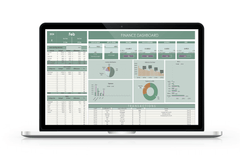Budgeting often gets a bad rap. For many, it conjures images of restrictive spreadsheets, cutting out every small indulgence, and a sense of financial drudgery. But the truth is, a budget is not about limiting your joy; it's about enabling it. A budget is your financial roadmap, guiding you toward your goals and helping you make the most of the money you have. Whether you’re saving for a big purchase, paying off debt, or simply trying to gain control over your finances, a budget is the tool that can help you get there. Here's why everyone needs a budget and how you can get started today.
Why Budgeting Matters
A budget is crucial because it gives you a clear understanding of where your money goes. Without it, overspending, debt, and living paycheck to paycheck become common issues. Budgeting helps you:
- Track Spending Habits: It highlights areas of overspending and reveals ways to save.
- Reach Financial Goals: Whether saving for a trip, a home, or an emergency fund, budgeting ensures you allocate funds toward your priorities.
- Reduce Financial Stress: A solid plan for managing money eases anxiety.
- Avoid Debt: It keeps you living within your means, preventing reliance on credit or loans.
- Prepare for the Future: Budgeting sets aside funds for retirement, education, and emergencies.
How to Get Started with Budgeting
Final Thoughts: Budgeting as a Path to Financial Freedom
Creating and sticking to a budget may seem daunting at first, but it’s one of the most empowering financial decisions you can make. A budget is not about restriction; it’s about gaining control over your finances and ensuring that your money is working for you. With a budget, you’ll be better equipped to handle life’s challenges, seize opportunities, and achieve your financial dreams.
Remember, budgeting is a journey, not a destination. It’s about making conscious choices that align with your values and goals. So, take the first step today—start budgeting, and unlock the path to financial freedom.
If you have enjoyed this article, please consider subscribing below. As a 'Thank You,' you’ll receive a free automated budget in Excel to help you get started on your financial journey!
